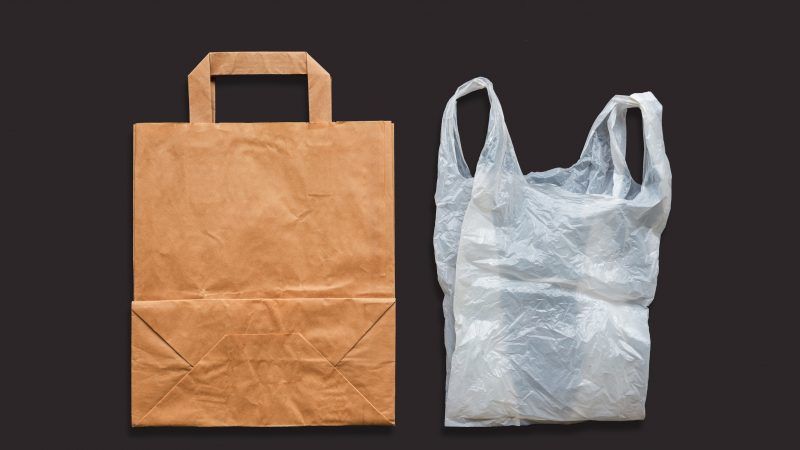New Jersey Bill Would Crack Down on Both Plastic and Paper Bags
For the first two months of the ban, stores would be required to give out free reusable bags instead.

"Paper or plastic?" may soon be a superfluous question in New Jersey.
On Thursday, the state Senate's Budget and Appropriations Committee advanced a bill that would ban grocery stores from giving customers either paper or plastic bags. Businesses would be required to give customers free reusable bags instead.
That last requirement will be in place for just the first two months after the ban takes effect. After that, customers will have to either bring their own bags or be prepared to carry loose groceries home in their arms.
A flat ban on single-use bags is radical, to say the least. New Jersey would be the first state to do it. New York and California have restricted themselves to banning only plastic bags.
The idea for New Jersey's more far-reaching restrictions reportedly came to the bill's sponsor, state Sen. Bob Smith (D–Middlesex), during his vacation to Aruba. There, plastic bags are banned and paper bags are slapped with heavy fees.
"Nobody's grumbling," Smith told NJ.com back in May. "Everybody in the line, they all do it."
Thursday's vote brings this aspect of island living a little closer to reality in the Garden State.
The bill would also give food service businesses two years to stop using Styrofoam. Plastic straws, a frequent target of anti-plastic activists and lawmakers, got off relatively easy: They won't be banned—but restaurants would be allowed to provide them only on request.
Backers claim the bill will protect New Jersey's natural environment. "This legislation is us fighting back to ensure we have clean oceans, clean ecosystems and to evolve our habits to include safe alternatives for our environment," Smith said in a press release issued after the committee vote.
If this version of the bill becomes law, violators will get a warning on their first offense. A second transgression will land a $1,000 fine, and scofflaws will pay up to $5,000 for their third violation.
The bill makes exceptions for bags used to carry uncooked meat, pharmaceuticals, newspapers, live animals (particularly fish and insects from pet stores), and laundry. It also exempts prepackaged foods from its bans.
Garden State lawmakers have been toying with the idea of restricting plastic bags for some time now. In 2018 the legislature passed a tax on plastic bags, but Democratic Gov. Phil Murphy vetoed it—for being too lenient.
Smith and state Sen. Linda Greenstein (D–Mercer) introduced their own bag ban in June 2018. One committee approved it in September, but it stalled in the Budget Committee until yesterday. It now goes to the Senate floor for a second reading.
Not everyone is happy about the proposal.
Paper bag manufacturers argued at yesterday's hearing that their product was a solution to plastic pollution, and that it should therefore be spared.
Michael Deloreto, a spokesperson for the New Jersey Food Council, pointed out that the free reusable bags required by the bill—ones with stitched handles, made of much thicker plastic or cloth, and designed for multiple uses—would cost a grocery store chain with 30 locations more than $20 million for the two months they're required to give them away. In comparison, giving away plastic bags costs about $128,000 a month.
Deloreto argued for letting stores give away slightly cheaper reusable bags. The Food Council says it supports a ban on paper and plastic bags.
Other single-use plastic bag bans have had the unintended side effect of prompting people simply to switch to reusable plastic bags that use much more plastic. Studies of bag bans in California and the U.K. have found that they dramatically increase the consumption of these reusable bags, with many customers treating them the same as single-use plastic bags.
Overall plastic consumption still fell in both cases. But in both California and the U.K., reusable bags were not distributed for free. New Jersey shoppers would face no such deterrent during the first two months of the bag ban, making it possible that in the short term the bill will increase overall plastic consumption.
At yesterday's hearing, ban supporters spoke of the tens of thousands of plastic and Styrofoam items they'd collected off the state's shoreline during an annual beach clean-up. But the bill would leave the biggest sources of litter untouched. According to a 2018 survey published by a state-funded nonprofit, the New Jersey Clean Communities Council (NJCCC), neither plastic bags nor paper bags were among the state's top 10 most littered items (which account for 43 percent of all litter). Styrofoam food containers didn't make the top 10 either. It instead featured things like tire scraps, business papers, plastic water bottles, and tobacco packaging and accessories.
Bags of all kinds made up 4.9 percent of litter. Unbranded retail bags made up 1.7 percent.
The results from the Ocean Conversancy's 2019 coastal cleanup were similar. Volunteers collected 37,440 items of trash off New Jersey's beaches, including 5,928 cigarette butts, 5,981 candy wrappers, and 1,047 plastic grocery bags—about 3 percent of all items collected.
The NJCCC survey includes a number of policy recommendations that don't involve banning items, including forging anti-litter partnerships with stores and other businesses that are litter hotspots, promoting more adopt-a-highway and adopt-a-beach programs, and better placement of public trash receptacles.
Such measures are both more voluntary and more effective. At best, all a bag ban can do is eliminate a tiny percentage of trash while inconveniencing customers and heaping more costs on business.
Rent Free is a weekly newsletter from Christian Britschgi on urbanism and the fight for less regulation, more housing, more property rights, and more freedom in America's cities.


Show Comments (54)